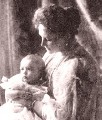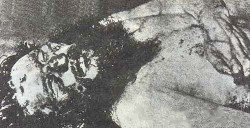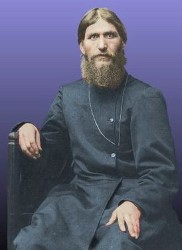Rasputin arrived in St. Petersburg in the robes of a monk, as a self-styled 'holy man', or 'staretz', with a reputation as a reckless drunkard, a healer, and a womaniser. He had created his own 'theology' from different cults and sects, and believed that a person had to sin in order to become holy. He aquired the name Rasputin as a nickname ... it means 'dissolute' or 'debauched' in Russian ... and he certainly lived up to his name. In addition to his less than upstanding ways, he was also dirty and unkempt. He never washed or changed clothes, and his greasy hair and ragged appearance helped convince his followers that he was a 'man of God'. He was also known for his intense personal magnetism, which was augmented by his piercing, (some said hypnotic) blue eyes.  In the first decade of the 1900's Russia was ruled by a Royal family. Nicholas II, the head of the Romanov family and the reigning Tsar, was surrounded in the palace by his family, including his wife Alexandra and their youngest son Alexis. The Tsar's youngest son Alexis suffered from a genetic disease called hemophilia, which resulted in uncontrolled bleeding and hemorrhaging, often leaving him weak and bedridden. The disease was incurable; doctors could do little except prescribe rest. Rasputin had, through friends of the Royal family, been invited to the palace, and it wasn't long before he became a confidante, telling stories to the children and giving Biblical advice to Alexandra. She became taken with him. Strangely, Rasputin's presence at Alexis' bedside often left him dramatically improved, to the great astonishment of the doctors. Alexandra requested Rasputin's presence whenever Alexis was overcome with the disease. At one point, Alexis suffered severe hemorrhaging, and Rasputin's presence seemed to miraculously help the boy recover. At this point (after about 1910), Rasputin's standing in the Russian community improved. As a favoured friend of the Royal family, he became the centre of attention at many social gatherings, and even managed to dress in clean clothes. But he was overbearing, disrespectful, obnoxious, and rude, and did not make many friends outside the Royal family. In fact, people outside the palace began to suspect he was a fraud, but Alexandra would not believe it when people told her this. Nicholas attempted to send Rasputin away, but Alexandra brought him back. Rasputin remained in favour at the palace. Meanwhile, the First World War had begun, and Russia was at war with Germany. In 1915 Nicholas took command of the Russian troops fighting the Germans. He left Alexandra, as Tsarina, to act as ruler in his absence. Of course, she had Rasputin at her side, acting as advisor, and giving advice on how to run the country, and how to conduct the war. Nicholas, regrettably, went along with her decisions. In a short time, the country was in chaos.  Since Alexis' hemophilia had always been a state secret, St. Petersburg society could not understand the Royal family's fascination with 'the Mad Monk', Rasputin. Rumours started that, with Nicholas away at the front, Rasputin had seduced the Tsarina and even her daughters. The Royal couple's position was becoming increasingly weak. There were suspicions that Rasputin and the 'foreigner' Alexandra (who was German) were secretly plotting to defeat Russia. Both the Russian nobility and the general population came to believe that Rasputin and Alexandra were destroying their country, and that Rasputin must go. Since Alexis' hemophilia had always been a state secret, St. Petersburg society could not understand the Royal family's fascination with 'the Mad Monk', Rasputin. Rumours started that, with Nicholas away at the front, Rasputin had seduced the Tsarina and even her daughters. The Royal couple's position was becoming increasingly weak. There were suspicions that Rasputin and the 'foreigner' Alexandra (who was German) were secretly plotting to defeat Russia. Both the Russian nobility and the general population came to believe that Rasputin and Alexandra were destroying their country, and that Rasputin must go.Several members of the Russian nobility, including Grand Duke Dimitri Pavlovich and Prince Felix Yussoupov, blaming all of Russia's troubles on the 'Mad Monk', began plotting to kill Rasputin. Prince Yussoupov invited Rasputin to a party at the Prince's palace. The assassins offered him cakes and wine, both heavily dosed with cyanide. After eating a few cakes with no ill effect, Rasputin complained of a dry throat and guzzled down the wine; at this point he had taken enough cyanide to kill several men! But he was still alive! Panicking, Yussoupov got a pistol and shot him in the chest. Rasputin was beaten, shot again, tied up, and eventually thrown into the freezing river.  Amazingly, three days later when an autopsy was performed on his recovered body, it became evident that Rasputin had died of drowning. He had been still alive when he hit the water!
Amazingly, three days later when an autopsy was performed on his recovered body, it became evident that Rasputin had died of drowning. He had been still alive when he hit the water!
Rasputin was buried in secrecy by the Royal family. The assassins had assumed that, with Rasputin dead and no longer able to influence Alexandra, his control of Nicholas would cease, and the Tsar would be free to choose competent officials who would be able to restore the fortunes of the country. But it was too late. Nicholas, apparently on the verge of a nervous breakdown, lost interest in governing the country, and Alexandra continued to make the political decisionson her own. But labour unrest, and her unpopular rule, were setting the stage for a revolution. Less than two years later, Nicholas had lost his throne, and the Imperial family were imprisoned and ultimately murdered at the hands of the revolutionary Bolsheviks.

This description of Rasputin's later life was researched using many sources, including various websites (not all of which were useful), several encyclopedias, and two high school textbooks. Especially interesting detailed information was obtained from a short essay by Hilda Ross, writing in the Canadian Social Studies textbook 'The Soviet Union', by Phyllis Arnold. When details didn't agree, we used Ms. Ross' interpretation. It was evident from our research that all the facts are not always known, or at least agreed upon, when researching historical events. None of the sources were completely in agreement regarding exact dates, although all of the principal characters and their actions were similarly described. Students wishing a more detailed and accurate portrayal of the events in Russia leading up to the First World War are urged to obtain a reading list from their Social Studies teacher. |
